#american empire
Text
Gentle reminder that the CIA and FBI has backdoors into every single major website, social media, media production company, news media, and so on.
Tumblr suppressing #palestine is not new behavior and whatever blue-haired Rae Dunn hipsters make up the majority of its staff, no matter their very likely liberal tendencies, likely have little to no say in the matter.
We live in the most evolved fascist empire in human history. Do not be surprised. They will do this and much, much worse if people on the Left actually start to become effective.
Expect lies, censorship, smears, deepfakes, blacklists, influencer sponsorships. Expect fake news.
#palestine#gaza#israel#isn'treal#al aqsa flood#zionism#genocide#settler colonialism#allahuakbar#leftism#socialism#communism#imperialism#anti imperialism#marxism leninism#america#american fascism#american empire#cia#fbi
16 notes
·
View notes
Text
Okay, So I am posting this for this purpose of pinning it to my blog. This is the list of all the social medias using 'usauthoritarianism'.
Notable inclusions: the subreddit https://reddit.com/r/USAuthoritarianism which actually has an anniversary coming up april 12. With 5 years, it is the oldest active social media using the name 'US Authoritarianism'. I actually neither founded this one nor interacted with it before starting the second notable: https://www.facebook.com/profile.php?id=100090010007468&mibextid=9R9pXO the facebook page. i put like 40$ into ads after i started posting there a lot when I lost my job. the money at least was well spent and its the largest page I made, at just over 200 likes.
The most recent and breakout hit: the lemmy group,. [email protected] which had a twitter screenshot about average income on the frontpage of that platform this week :D
#US Authoritarianism#US Authoritarianism Project#police#authoritarianism#prison abolition#usa#gerrymandering#US Empire#American Empire#anarchism#anarchist#organizing#organize#lemmy#linktree#reddit#facebook
3 notes
·
View notes
Text
"Like Nguyen’s other books, this memoir is critical of the US military-industrial complex. His oppositional stance informs his support of the Boycott, Divestment, and Sanctions movement, and since the outbreak of the Israel-Gaza war, he’s been a vocal advocate for a cease-fire. Two dates on his tour had to be moved to different locations, partly because of his public position on the conflict. The cancellations underlined what his writing has sought to uncover: As Americans, Nguyen says, we’re trained “to think of wars as episodic” rather than as a continuous production of the American war machine and its long history. He’s made it his life’s mission to trace these larger connections until they are impossible to ignore."
....
“The work of dominant ideologies is to prevent people from seeing how their particular situation might in some way be related to somebody else. If people can’t see these connections, they’re trapped in their singular sorrows,” he says. “That’s not politically productive. But if you connect the singular sorrows, that becomes ever more radical.”
2 notes
·
View notes
Text
"The LGBTQ+ lobby has decisively taken over the American empire. But given that obvious fact, can we now at least be spared the sanctimonious claptrap that pervades the other 11 months of the year, that which complains about continuing marginalization, negative stereotyping, and oppression by a hostile culture? That’s nonsense, as Pride Month makes very clear indeed."
~ Carl R. Trueman
9 notes
·
View notes
Text

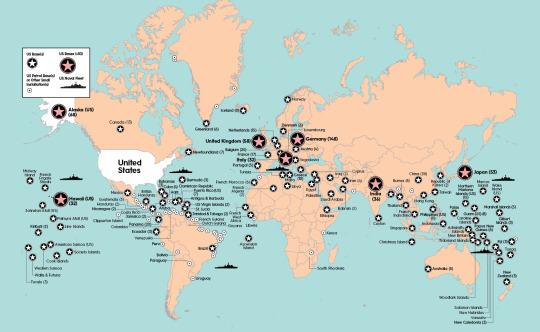
(Jacobin Article)
3 notes
·
View notes
Text

Just a reminder that Sharbat Gula has never made any money from Steve McCurry’s photo Afghan Girl, and that the photos of her were taken and published without her permission.
#Americans love profiting off of and romanticizing war while doing fuck all to help refugees and people living in the countries THEY invaded#and destroyed#Afghanistan#american imperialism#American empire#imperialism
60 notes
·
View notes
Text
todays a good day to remember the us is an empire built on genocide and slavery, not to mention all the sovereign nations they invaded on flimsy and even falsified justifications to extract corporate wealth and movements for liberation they crush -Mae
5 notes
·
View notes
Photo

“The foothold created by prisoner-built roads in the Canal Zone enabled colonial officials, army engineers, and politicians in the United States to train their sights on a Pan-American Highway, which would run north-south from Alaska to Argentina. Convict road building in Panamá became part of the massively increased federal support for convict road building projects across states, territories, and colonies under US jurisdiction. Federal officials, meanwhile, pushed their modernizing agenda for prisons and roads at the convenings of international organizations like the Pan American Union (PAU) and the Pan American Prison Congress. The Pan-American Highway was shrouded in the rhetoric of hemispheric harmony, and PAU Director General L.S. Row described the “Good Roads Movement” as encapsulating “the very essence of true Pan-Americanism.”
E.W. James, chief of the inter-American regional office of the Public Roads Administration, promised the highway would open up great tracts of land and offer US motorists scenes of “exotic interest,” discovery, and adventure. Probably “no white man” has ever traveled between Central and South America overland, he wrote referring to the Darién Gap between Panamá and Columbia. He provided a list of voyages along portions of the highway, including that of Zone policeman 88, Harry A. Franck. At the 1915 Panama-Pacific World’s Fair in San Francisco, the US Office of Public Roads staged the most comprehensive road exhibit to date. By the end of World War II, the inter-American portion between the United States and Panamá included 1,557 miles of paved roadway, 930 miles of all-weather, 280 miles of dry-weather, and 567 miles of trails. “The last quarter century in the Western Hemisphere has been preeminently an era of road building,” James proudly concluded.
Forced transportation was central to the chattel mode of incarceration, along with degrading hard labor. Throughout the period of US canal construction, 1904–1914, police and prison officials routinely deported people from the Zone. Indeed, when he was appointed police chief, George Shanton saw it as his first order of business. Before he was even expressly granted expanded deportation powers, he gathered members of Teddy Roosevelt’s “Rough Riders” and other “American gunmen” to round up any “bad men” in the newly occupied territory.
“We went after them and some we found necessary to kill off but the great majority were gradually rounded up and placed in the stocks, later being put into bull-pens which we constructed,” he told the Boston Globe years later. “The next thing to do was to get them out of the country altogether,but we were in a position where we could not legally deport them. So we rounded up some old three masters […] and, bundling the birds all aboard, shot them off to the Islands thereabout.”
His nonchalance masked a more systematic process of targeted depopulation that combined Spanish-speaking Afro-Panamanians, French-speaking Martinicans, and English-speaking Jamaicans and Barbadians under the general category of “negro criminal,” who were then indiscriminately sent off to neighboring Caribbean islands. “With them out of the Zone,” Shanton wrote, “we were then in a position of refusing them entrance should they attempt to return.”
Canal Zone District Attorney William Jackson argued that the “great expense” the government had incurred by paying to transport some twenty thousand workers from Barbados and elsewhere in the West Indies “abundantly justified” expanded powers of deportation and judicial cost savings measures. The Canal Zone government paid the cost of deportation, he added, and rightly recouped the “enormous expense incident to jury trials.” As with other labor recruitment contracts, some officials worried they were skirting a line too near slavery. Responding to John Steven’s request to import more Chinese laborers, for instance, Secretary of War William Taft wrote, “peonage or coolieism, which shortly stated is slavery by debt, is as much in conflict with the Thirteenth Amendment of the Constitution as the usual form of slavery.” Others were less concerned. Despite apparent ambiguities in charting these degrees of unfreedom, they knew for certain that the Thirteenth Amendment’s convict clause provided that those convicted of a crime would become slaves of the state. Following a paradigm of patriarchal governance, Canal officials also assumed that other forms of dependent or coerced labor—of women, children, and colonial subjects—were part of the natural order of things. Evidently paying the passage of a small fraction of the total Canal Zone workforce had metaphorically, if not contractually, already indentured much wider segments of the population in the eyes of certain administrators.
...
The police and prison guards charged with implementing the forced labor program brought their own ideas about dependency, deviance, punishment, and work. Racialized labor control schemes had been vitally important to their jobs throughout the American empire. Zone policemen like Harry Franck and Robert Lamastus remarked that their fellow officers were mostly Southerners and almost all military men. Police Chief George Shanton, for instance, had served in the Rough Riders during the US wars in Puerto Rico and the Philippines. His successor had been a Confederate blockade runner, and the police chief after him was a former US Marshal in Indian Territory. When a police chase was on, wrote Harry Franck, everyone from the lieutenant down to the newest rookie would swarm out of the police station: “[T]he most apathetic of the force were girding up their loins with the adventurous fire of the old Moro-hunting days in their eyes, and all, some ahorse, more afoot, were dashing one by one out into the night and the jungle.” With this turn of phrase, Franck evoked the experience of colonial violence from fighting in the predominantly Muslim region of the Philippine archipelago to characterize the rush of tracking alleged outlaws in the Panamanian jungles as a kind of manly “adventure.”
Robert Lamastus, who was put in charge of working prisoners outside the penitentiary, exemplified many of these elements guards brought to the road gangs. With his family back in Kentucky, heavily indebted after the Civil War, he had gone fortune-seeking in the far reaches of the Northwest, joining the army in Alaska. He dreamed of striking it rich prospecting for gold or purchasing land to clear and cultivate. Yet his letters home made clear that he envisioned himself directing rather than performing hard physical labor; referring to farm work, for example, he exclaimed that there were “plenty of easier ways of making a living besides working like a slave for it.” Lamastus joined the police force in 1907 and was rapidly promoted. Within two years he was making $107.50 per month, five times what he earned when he first enlisted in the army, and the following year he received an additional $10 a month to serve as labor foreman over prisoners at Culebra. “We are building roads with them,” he wrote home, “I start work at 7 in the morning and I am through 5:30 in the evening.”
After successfully completing his road building assignments in the town of Empire, he was made Assistant Deputy Warden in charge of all outside work. “I was promoted on the 19th of Dec. my pay is $125 per mo.” he proudly wrote home. In addition to his salary, as Gold Roll employees, white police and prison officers like Robert Lamastus also received the full range of government benefits including paid housing, health care, and vacations. The racially segregated social and economic hierarchies he and his colleagues helped establish in the Canal Zone therefore ensured that white American men, as a group, would stand to gain the most from the incarceration and forced labor of Zone inhabitants deemed criminals.
The Canal Zone governors, wardens, police, and prison guards who implemented the prison labor program drew on techniques of labor extraction and domination that had characterized the American expansion under slavery, settler colonialism, and war-making. While they were not all members of the ex-Confederate diaspora who sought to spread white supremacy across the Caribbean to Brazil, or across the Pacific to Hawaii, Fiji, and Australia, most shared lived experiences of slavery and colonial violence. They also shared a vision of patriarchal mastery and racial hierarchy in which white men assumed themselves to be the head, performing mental and skilled labor, and racialized others to be the body, performing unskilled, physically demanding, menial labor. Their vision of white settler-colonial agricultural development depended on roads being built throughout the Zone and across Panamá. It also provided prison administrators and guards a unique avenue of upward social mobility. After a career commanding prison labor in the Canal Zone and directing the Panamanian island prison colony at Coiba, for example, Robert Lamastus went on to set up coffee plantations in Boquete, Chiriqui, that have remained in his family to this day.”
- Benjamin D. Weber, “The Strange Career of the Convict Clause: US Prison Imperialism in the Panamá Canal Zone,” International Labor and Working-Class History No. 96, Fall 2019, p. 88-90, 91-92.
Image at top is: “Road Making by Convicts” from Willis J. Abott, PANAMA And the Canal IN PICTURE AND PROSE. New York: Syndicate Publishing Company, 1913. p. 352.
#panama canal#canal zone#thirteenth amendment#convict clause#convict labour#american prison system#american empire#u.s. imperialism#penal labour#slavery by another name#settler colonialism#road building#road work#prison camp#good roads movement#bad boys make good roads#academic quote#academic research#history of crime and punishment#united states history#prison guards#racism in america#shoveling out the unwanted
29 notes
·
View notes
Text
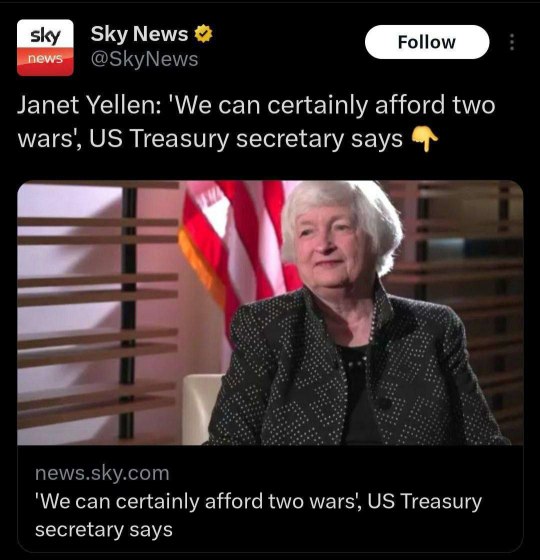
As someone recently said: We are run by psychos
#military industrial complex#endless war#american empire#american imperialism#america is the bad place#janet yellen
6 notes
·
View notes
Text
I think that there are some very simple roots to the current crises in the United States:
Most of them have been pretty well discussed if oftentimes slanted in the direction of the US Right. One of them seldom truly tends to be acknowledged and it is simply that the United States is finally, belatedly, being forced to reckon in a way even its elites, political and cultural, cannot ignore with its limitations. The cheap empire expanded to the west at the expense of Indigenous peoples from Hawaii and Alaska to the initial 13 colonies and then the post-WWII boom when everyone else blew themselves up directly via the war or indirectly via colonial looting and pillaging allowed a great deal of illusions to thrive.
The United States has been accustomed to sweeping results for relatively cheap investments in a halfassed fashion and this pattern has worked amazingly well for a long time. It's worked well for long enough that the assumption was made, very dangerously, that the conditions that allow it to do so would themselves be eternal. As it proved these assumptions were based on very dubious foundations and are falling apart between the recovery of other parts of the world and the USA starting and losing not one but two idiotic wars.
As Mao well put it, all power comes from the barrel of a gun and the United States' idiotic wars dented its military credibility. One need only look at Russia's self-imposed clusterfuck in Ukraine to see that the association of political and military power is very much still intertwined in the age of drone warfare as it was in the days when the sword and the pike were the cutting edge innovations.
Centuries of being able to delude itself that its power was beyond these rules have created a crisis the United States is unsuited to match, in terms of its political, cultural, or military elites simply because it's never had to do things the other way and it doesn't know how. And creating the will is simpler than creating the means to exercise that will. And there are zero major political factions interested in creating the will.
8 notes
·
View notes
Text
So we all know and love The Divine Son of the Deified Julius Caesar, Princeps Senatus, Imperator Gaius Julius Caesar Octavianus Augustus...
Y'know, the dude that made the Roman Empire an empire
Now fans and haters of Augustus know very well how good he was at propaganda, declaring himself a time lord, making sure everyone viewed him as Rome and Rome as him, and the glory of the Pax Romana. Its fair to say that no one could gather a crowd quite like Augustus could...
The modern equivalent is getting a bunch of teenagers to make a fancam of you
So rest assured, when my adopted father becomes dictator of the American Republic and gets assassinated, I WILL buddy up with his right hand man, kill my dad's assassins, kill my ally, have the coolest right hand man (Agrippa 2.0. baby), cheat death numerous times, and establish an authoritarian government for the American Empire by exploiting its commerce and military structure...
But I will not be declaring myself time lord. I will simply make sure I'm recorded and photographed a lot so said videos and images can be placed over the biggest song at the time. That's the way to empire, baby
#emperor augustus#roman empire#roman republic#america#united states#usa#propaganda#american empire#monarchy#totalitarianism
8 notes
·
View notes
Video
youtube
Team America World Police: MCU by Skip Intro
#thought provoking#copaganda#propaganda#media manipulation#jingoism#american imperialism#war on terror#American empire#military propaganda#capitalism#capitalist propaganda#110/365
5 notes
·
View notes
Photo
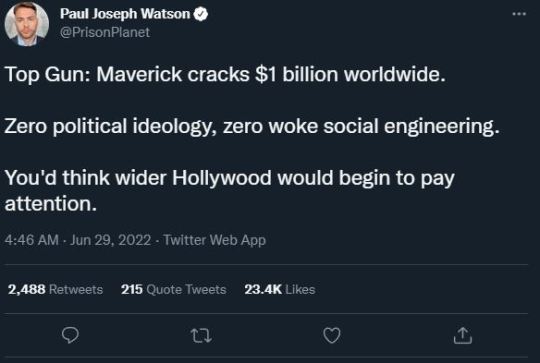
This is remarkable in either it’s stupidity or ignorance.
5 notes
·
View notes
Text
29/04/24: reblogs have been turned off for a few days. Check replies.
17/12/23 this masterlist has been completely, vetted, revamped and reformatted with free access to all reading and viewing material. It will be updated and edited periodically so please try and reblog the original post if you're able.
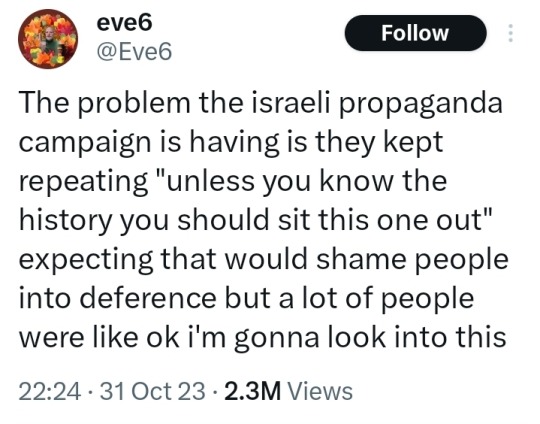
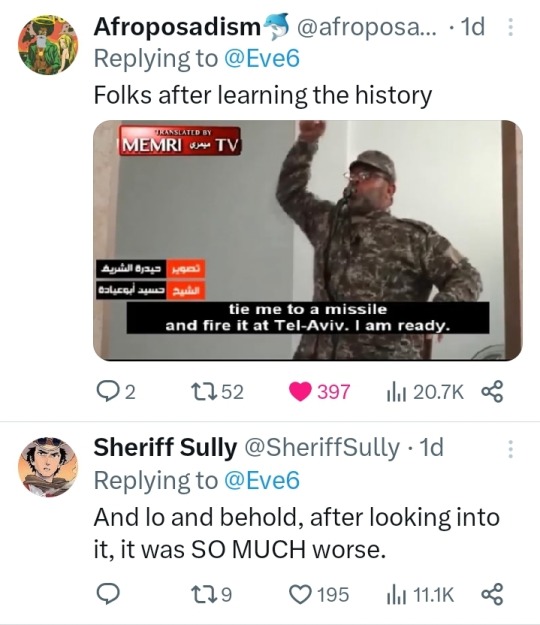

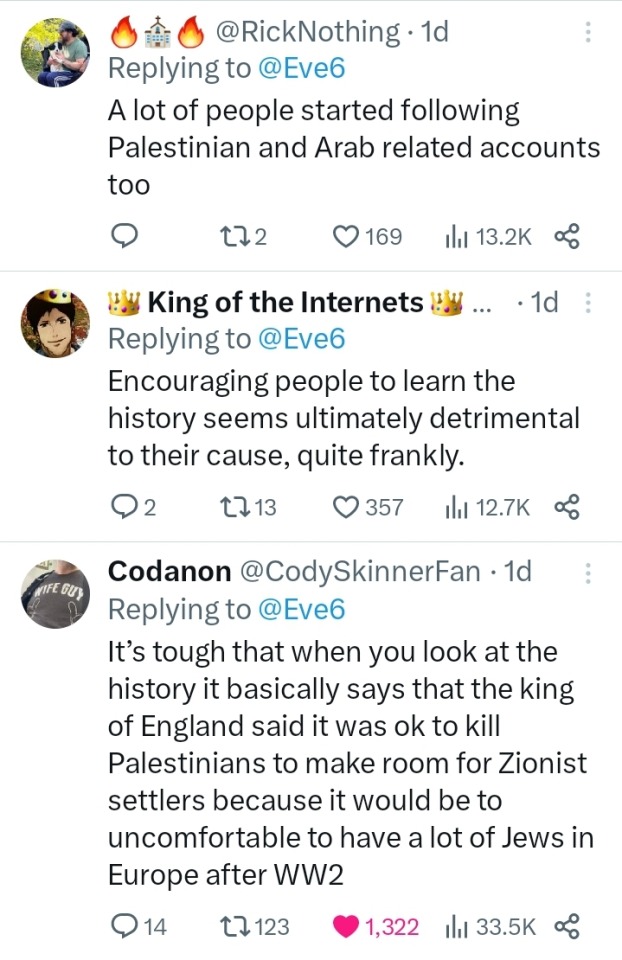
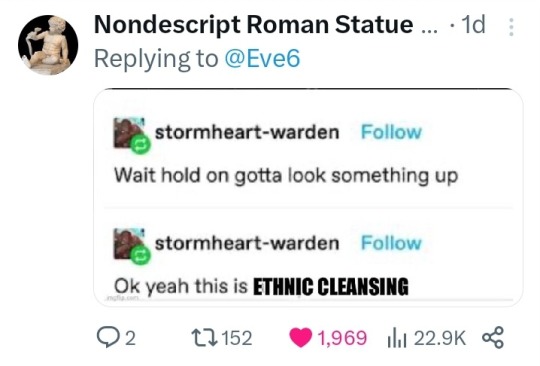
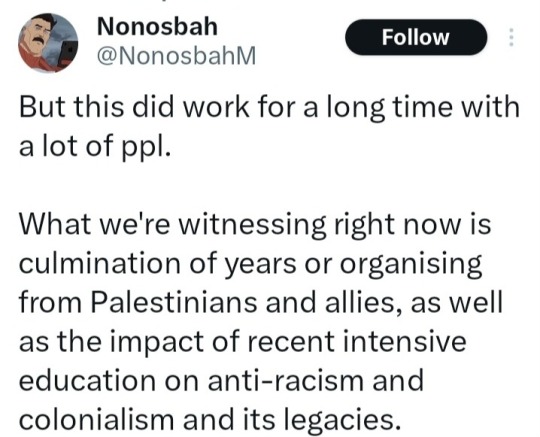
The Big Damn List Of Stuff They Said You Didn't Know
(Yes, it's a lot. Just choose your preferred medium and then pick one.)
Podcasts
Backgrounders and Quick Facts
Interactive Maps
Teach-Out Resources
Reading Material (free)
Films and Documentaries (free)
Non-Governmental Organizations
Social Media
How You Can Help
Podcasts
Cocktails & Capitalism: The Story of Palestine Part 1, Part 3
It Could Happen Here: The Cheapest Land is Bought with Blood, Part 2, The Balfour Declaration
Citations Needed: Media narratives and consent manufacturing around Israel-Palestine and the Gaza Siege
The Deprogram: Free Palestine, ft. decolonizatepalestine.com.
Backgrounders and Quick Facts
The Palestine Academy: Palestine 101
Institute for Middle East Understanding: Explainers and Quick Facts
Interactive Maps
Visualizing Palestine
Teach-Out Resources
1) Cambridge UCU and Pal Society
Palestine 101
Intro to Palestine Film + Art + Literature
Resources for Organising and Facilitating)
2) The Jadaliya YouTube Channel of the Arab Studies Institute
Gaza in Context Teach-in series
War on Palestine podcast
Updates and Discussions of news with co-editors Noura Erakat and Mouin Rabbani.
3) The Palestine Directory
History (virtual tours, digital archives, The Palestine Oral History Project, Documenting Palestine, Queering Palestine)
Cultural History (Palestine Open Maps, Overdue Books Zine, Palestine Poster Project)
Contemporary Voices in the Arts
Get Involved: NGOs and campaigns to help and support.
3) PalQuest Interactive Encyclopedia of the Palestine Question.
4) The Palestine Remix by Al Jazeera
Books and Articles
Free reading material
My Gdrive of Palestine/Decolonization Literature (nearly all the books recommended below + books from other recommended lists)
Five free eBooks by Verso
Three Free eBooks on Palestine by Haymarket
LGBT Activist Scott Long's Google Drive of Palestine Freedom Struggle Resources
Recommended Reading List
Academic Books
Edward Said (1979) The Question of Palestine, Random House
Ilan Pappé (2002)(ed) The Israel/Palestine Question, Routledge
Ilan Pappé (2006) The Ethnic Cleansing of Palestine, OneWorld Publications
Ilan Pappé (2011) The Forgotten Palestinians: A History of the Palestinians in Israel, Yale University Press
Ilan Pappé (2015) The Idea of Israel: A History of Power and Knowledge, Verso Books
Ilan Pappé (2017) The Biggest Prison On Earth: A History Of The Occupied Territories, OneWorld Publications
Ilan Pappé (2022) A History of Modern Palestine, Cambridge University Press
Rosemary Sayigh (2007) The Palestinians: From Peasants to Revolutionaries, Bloomsbury
Andrew Ross (2019) Stone Men: the Palestinians who Built Israel, Verso Books
Rashid Khalidi (2020) The Hundred Years’ War on Palestine: A History of Settler Colonialism and Resistance 1917–2017
Ariella Azoulay (2011) From Palestine to Israel: A Photographic Record of Destruction and State Formation, 1947-1950, Pluto Press
Ariella Azoulay and Adi Ophir (2012) The One-State Condition: Occupation and Democracy in Israel/Palestine, Stanford University Press.
Jeff Halper (2010) An Israeli in Palestine: Resisting Dispossession, Redeeming Israel, Pluto Press
Jeff Halper (2015) War Against the People: Israel, the Palestinians and Global Pacification
Jeff Halper (2021) Decolonizing Israel, Liberating Palestine: Zionism, Settler Colonialism, and the Case for One Democratic State, Pluto Press
Anthony Loewenstein (2023) The Palestine Laboratory: How Israel exports the Technology of Occupation around the World
Noura Erakat (2019) Justice for Some: Law and the Question of Palestine, Stanford University Press
Neve Gordon (2008) Israel’s Occupation, University of California Press
Joseph Massad (2006) The Persistence of the Palestinian Question: Essays on Zionism and the Palestinians, Routledge
Memoirs
Edward Said (1986) After the Last Sky: Palestine Lives, Columbia University PEdward Saidress
Edward Said (2000) Out of Place; A Memoir, First Vintage Books
Mourid Barghouti (2005) I saw Ramallah, Bloomsbury
Hatim Kanaaneh (2008) A Doctor in Galilee: The Life and Struggle of a Palestinian in Israel, Pluto Press
Raja Shehadeh (2008) Palestinian Walks: Into a Vanishing Landscape, Profile Books
Ghada Karmi (2009) In Search of Fatima: A Palestinian Story, Verso Books
Vittorio Arrigoni (2010) Gaza Stay Human, Kube Publishing
Ramzy Baroud (2010) My Father Was a Freedom Fighter: Gaza's Untold Story, Pluto Press
Izzeldin Abuelaish (2011) I Shall Not Hate: A Gaza Doctor’s Journey on the Road to Peace and Human Dignity, Bloomsbury
Atef Abu Saif (2015) The Drone Eats with Me: A Gaza Diary, Beacon Press
Anthologies
Voices from Gaza - Insaniyyat (The Society of Palestinian Anthropologists)
Letters From Gaza • Protean Magazine
Salma Khadra Jayyusi (1992) Anthology of Modern Palestinian Literature, Columbia University Press
ASHTAR Theatre (2010) The Gaza Monologues
Refaat Alreer (ed) (2014) Gaza Writes Back, Just World Books
Refaat Alreer, Laila El-Haddad (eds) (2015) Gaza Unsilenced, Just World Books
Cate Malek and Mateo Hoke (eds)(2015) Palestine Speaks: Narrative of Life under Occupation, Verso Books
Jehad Abusalim, Jennifer Bing (eds) (2022) Light in Gaza: Writings Born of Fire, Haymarket Books
Short Story Collections
Ghassan Kanafani, Hilary Kilpatrick (trans) (1968) Men in the Sun and Other Palestinian Stories, Lynne Rienner Publishers
Ghassan Kanafani, Barbara Harlow, Karen E. Riley (trans) (2000) Palestine’s Children: Returning to Haifa and Other Stories, Lynne Rienner Publishers
Atef Abu Saif (2014) The Book of Gaza: A City in Short Fiction, Comma Press
Samira Azzam, Ranya Abdelrahman (trans) (2022) Out Of Time: The Collected Short Stories of Samira Azzam
Sonia Sulaiman (2023) Muneera and the Moon; Stories Inspired by Palestinian Folklore
Essay Collections
Edward W. Said (2000) Reflections on Exile and Other Essays, Harvard University Press
Salim Tamari (2008) Mountain against the Sea: Essays on Palestinian Society and Culture, University of California Press
Fatma Kassem (2011) Palestinian Women: Narratives, histories and gendered memory, Bloombsbury
Ramzy Baroud (2019) These Chains Will Be Broken: Palestinian Stories of Struggle and Defiance in Israeli Prisons, Clarity Press
Novels
Sahar Khalifeh (1976) Wild Thorns, Saqi Books
Liyana Badr (1993) A Balcony over the Fakihani, Interlink Books
Hala Alyan (2017) Salt Houses, Harper Books
Susan Abulhawa (2011) Mornings in Jenin, Bloomsbury
Susan Abulhawa (2020) Against the Loveless World, Bloomsbury
Graphic novels
Joe Sacco (2001) Palestine
Joe Sacco (2010) Footnotes in Gaza
Naji al-Ali (2009) A Child in Palestine, Verso Books
Mohammad Sabaaneh (2021) Power Born of Dreams: My Story is Palestine, Street Noise Book*
Poetry
Fady Joudah (2008) The Earth in the Attic, Sheridan Books,
Ghassan Zaqtan, Fady Joudah (trans) (2012) Like a Straw Bird It Follows Me and Other Poems, Yale University Press
Hala Alyan (2013) Atrium: Poems, Three Rooms Press*
Mohammed El-Kurd (2021) Rifqa, Haymarket Books
Mosab Abu Toha (2022) Things You May Find Hidden in My Ear: Poems from Gaza, City Lights Publishers
Tawfiq Zayyad (2023) We Are Here to Stay, Smokestack Books*
The Works of Mahmoud Darwish
Poems
Rafeef Ziadah (2011) We Teach Life, Sir
Nasser Rabah (2022) In the Endless War
Refaat Alareer (2011) If I Must Die
Hiba Abu Nada (2023) I Grant You Refuge/ Not Just Passing
[All books except the ones starred are available in my gdrive. I'm adding more each day. But please try and buy whatever you're able or borrow from the library. Most should be available in the discounted Free Palestine Reading List by Pluto Press, Verso and Haymarket Books.]
Human Rights Reports & Documents
Information on current International Court of Justice case on ‘Legal Consequences arising from the Policies and Practices of Israel in the Occupied Palestinian Territory, including East Jerusalem’
UN Commission of Inquiry Report 2022
UN Special Rapporteur Report on Apartheid 2022
Amnesty International Report on Apartheid 2022
Human Rights Watch Report on Apartheid 2021
Report of the United Nations Fact-Finding Mission on the Gaza Conflict’ 2009 (‘The Goldstone Report’)
Advisory Opinion on the Legal Consequences of the Construction of a Wall in the Occupied Palestinian Territory, International Court of Justice, 9 July 2004
Films
Documentaries
Jenin, Jenin (2003) dir. Mohammed Bakri
Massacre (2005) dir. Monica Borgmann, Lokman Slim, Hermann Theissen
Slingshot HipHop (2008) dir. Jackie Reem Salloum
Waltz with Bashir (2008) dir. Ari Folman † (also on Amazon Prime)
Tears of Gaza (2010) dir. Vibeke Løkkeberg (also on Amazon Prime)
5 Broken Cameras (2011) dir. Emad Burnat (also on Amazon Prime)
The Gatekeepers (2012) dir. Dror Moreh (also on Amazon Prime)
The Great Book Robbery (2012) | Al Jazeera English
Al Nakba (2013) | Al Jazeera (5-episode docu-series)
The Village Under the Forest (2013) dir. Mark J. Kaplan
Where Should The Birds Fly (2013) dir. Fida Qishta
Naila and the Uprising (2017) (also on Amazon Prime)
GAZA (2019) dir. Andrew McConnell and Garry Keane
Gaza Fights For Freedom (2019) dir. Abby Martin
Little Palestine: Diary Of A Siege (2021) dir. Abdallah Al Khatib
Palestine 1920: The Other Side of the Palestinian Story (2021) | Al Jazeera World Documentary
Gaza Fights Back (2021) | MintPress News Original Documentary | dir. Dan Cohen
Innocence (2022) dir. Guy Davidi
Short Films
Fatenah (2009) dir. Ahmad Habash
Gaza-London (2009) dir. Dina Hamdan
Condom Lead (2013) dir. Tarzan Nasser, Arab Nasser
OBAIDA (2019) | Defence for Children Palestine
Theatrical Films
Divine Intervention (2002) | dir. Elia Suleiman (also on Netflix)
Paradise Now (2005) dir Hany Abu-Assad (also on Amazon Prime)
Lemon Tree (2008) (choose auto translate for English subs) (also on Amazon Prime)
It Must Be Heaven (2009) | dir. Elia Suleiman †
The Promise (2010) mini-series dir. Peter Kosminsky (Part 1, Part 2, Part 3, Part 4)
Habibi (2011)* dir. Susan Youssef
Omar (2013)* dir. Hany Abu-Assad †
3000 Nights (2015)* dir. Mai Masri
Foxtrot (2017) dir. Samuel Maoz (also on Amazon Prime)
The Time that Remains (2019) dir. Elia Suleiman †
Gaza Mon Amour (2020) dir. Tarzan Nasser, Arab Nasser †
The Viewing Booth (2020) dir. Ra'anan Alexandrowicz (on Amazon Prime and Apple TV)
Farha (2021)* | dir. Darin J. Sallam
Palestine Film Institute Archive
All links are for free viewing. The ones marked with a star (*) can be found on Netflix, while the ones marked † can be downloaded for free from my Mega account.
If you find Guy Davidi's Innocence anywhere please let me know, I can't find it for streaming or download even to rent or buy.
In 2018, BDS urged Netflix to dump Fauda, a series created by former members of IOF death squads that legitimizes and promotes racist violence and war crimes, to no avail. Please warn others to not give this series any views. BDS has not called for a boycott of Netflix. ]
Planning to link two separate posts here listing all the books in my drive and all the films I couldn't include here. Check back for updates.
NGOs
The Boycott, Divestment, Sanctions (BDS) Movement
Medical Aid for Palestinians
Euro-Mediterranean Human Rights Monitor
Palestine Defence for Children International
Palestinian Feminist Collective
Al-Shabaka: The Palestinian Policy Network
Addameer Prisoner Support and Human Rights Association
Institute for Palestine Studies
Al Haq
Artists for Palestine
The Palestine Museum
Jewish Currents
B’Tselem
DAWN
Social Media
Palestnians on Tumblr
@el-shab-hussein
@killyfromblame
@apollos-olives
@fairuzfan
@palipunk
@sar-soor
@nabulsi
@ibtisams
@wearenotjustnumbers2
@90-ghost (is in Gaza right now. Please donate to his GFM and boost it.)
@tamarrud
Allies and advocates (not Palestinian)
@bloglikeanegyptian beautiful posts that read like op-eds
@vyorei daily news roundups
@luthienne resistance through prose
@decolonize-the-left scoop on the US political plans and impacts
@feluka
(Please don't expect any of these blogs to be completely devoted to Palestine allyship; they do post regularly about it but they're still personal blogs and post whatever else they feel like. Do not harrass them.)
Gaza journalists
Motaz Azaiza IG: @motaz_azaiza | Twitter: @azaizamotaz9 | TikTok: _motaz.azaiza (left Gaza as of Jan 23)
Bisan Owda IG and TikTok: wizard_bisan1 | Twitter: @wizardbisan
Saleh Aljafarawi IG: @saleh_aljafarawi | Twitter: @S_Aljafarawi | TikTok: @saleh_aljafarawi97
Plestia Alaqad IG: @byplestia | TikTok: @plestiaaqad (left Gaza)
Wael Al-Dahdouh IG: @wael_eldahdouh | Twitter: @WaelDahdouh (left Gaza as of Jan 13)
Hind Khoudary IG: @hindkhoudary | Twitter: @Hind_Gaza
Ismail Jood IG and TikTok: @ismail.jood (announced end of coverage on Jan 25)
Yara Eid IG: @eid_yara | Twitter: @yaraeid_
Eye on Palestine IG: @eye.on.palestine | Twitter: @EyeonPalestine | TikTok: @eyes.on.palestine
Muhammad Shehada Twitter: @muhammadshehad2
(Edit: even though some journos have evacuated, the footage up to the end of their reporting is up on their social media, and they're also doing urgent fundraisers to get their families and friends to safety. Please donate or share their posts.)
News organisations
The Electronic Intifada Twitter: @intifada | IG: @electronicintifada
Quds News Network Twitter and Telegram: @QudsNen | IG: @qudsn (Arabic)
Times of Gaza IG: @timesofgaza | Twitter: @Timesofgaza | Telegram: @TIMESOFGAZA
The Palestine Chronicle Twitter: @PalestineChron | IG: @palestinechron | @palestinechronicle
Al-Jazeera Twitter: @AJEnglish | IG and TikTok: @aljazeeraenglish, @ajplus
Middle East Eye IG and TikTok: @middleeasteye | Twitter: @MiddleEastEye
Democracy Now Twitter and IG: @democracynow TikTok: @democracynow.org
Haaretz* Twitter: @Haaretz | IG: haaretzcom
Mondoweiss IG and TikTok: @mondoweiss | Twitter: @Mondoweiss
The Intercept Twitter and IG: @theintercept
MintPress Twitter: @MintPressNews | IG: mintpress
Novara Media Twitter and IG: @novaramedia
Truthout Twitter and IG: @truthout
[*Please note that Haaretz is an Israeli Liberal Zionist newspaper and heavily propagandized against Palestine. It's included here only as a Zionist critic of the Israeli government and IDF from within Israel.]
Palestnians on Other Social Media
Mouin Rabbani: Middle East analyst specializing in the Arab-Israeli conflict and Palestinian affairs. Twitter: @MouinRabbani
Noura Erakat: Legal scholar, human rights attorney, specialising in Israeli–Palestinian conflict. Twitter: @4noura | IG: @nouraerakat | (http://www.nouraerakat.com/)
Hebh Jamal: Journalist in Germany. IG and Twitter: @hebh_jamal
Ghada Sasa: PhD candidate in International Relations, green colonialism, and Islam in Canada. Twitter: @sasa_ghada | IG: @ghadasasa48
Taleed El Sabawi: Assistant professor of law and researcher in public health. Twitter: @el_sabawi | IG
Lexi Alexander: Filmmaker and activist. Twitter: @LexiAlex | IG: @lexialexander1
Mariam Barghouti: Writer, blogger, researcher, and journalist. Twitter: @MariamBarghouti | IG: @mariambarghouti
Rasha Abdulhadi: Queer poet, author and cultural organizer. Twitter: @rashaabdulhadi
Mohammed el-Kurd: Writer and activist from Jerusalem. IG: @mohammedelkurd | Twitter: @m7mdkurd
Ramy Abdu: Founder and Chairman of the Euro-Mediterranean Human Rights Monitor. Twitter: @RamyAbdu
Subhi: Founder of The Palestine Academy website. IG: @sbeih.jpg |TikTok @iamsbeih | Twitter: @iamsbeih
Allies
Lowkey (Kareem Dennis): Rapper, activist, video and podcast host for MintPress. Twitter: @LowkeyOnline IG: @lowkeyonline
Francesca Albanese: UN Special Rapporteur on the Occupied Territories. Twitter: @FranceskAlbs
Sana Saeed: Journalist and media critic, host and senior producer at Al-Jazeera Plus. IG: @sanaface | Twitter: @SanaSaeed
Shailja Patel: Poet, playwright, activist, founding member of Kenyans For Peace, Truth and Justice. Twitter: @shailjapatel
Jairo I. Fúnez-Flores: Researcher in curriculum studies, decolonial theory, social movements. Twitter: @Jairo_I_Funez
Jack Dodson: Journalist and Filmmaker. Twitter: @JackDodson IG: @jdodson4
Imani Barbarin: Writer, public speaker, and disability rights activist. IG: @crutches_and_spice | Twitter: @Imani_Barbarin | TikTok: @crutches_and_spice
Jewish Allies
Katie Halper: US comedian, writer, filmmaker, podcaster, and political commentator. IG and Twitter: @kthalps
Amanda Gelender: Writer. Twitter: @agelender | (https://agelender.medium.com/)
Yoav Litvin: Jerusalem-born Writer and Photographer. IG and Twitter: @nookyelur | (yoavlitvin.com)
Alana Lentin: Professor of Cultural and Social Analysis at Western Sydney University. Twitter: @alanalentin
Gideon Levy: anti-Zionist Israeli journalist and activist. Twitter: @gideonle
How You Can Help Palestine
How to be an Ally 101
URGENT‼️📢: Global Strike Guide
If any links are broken let me know. Or pull up the current post to check whether it's fixed.
"Knowledge is Israel's worst enemy. Awareness is Israel's most hated and feared foe. That's why Israel bombs a university: it wants to kill openness and determination to refuse living under injustice and racism."
— Dr. Refaat Alareer, (martyred Dec 6, 2023)
From River To The Sea Palestine Will Be Free 🇵🇸🇵🇸🇵🇸
-----
Edit 1: took the first video down because turns out the animator is a terf and it links to her blog. Really sorry for any distress.
Edit 2: All recommended readings + Haymarket recommendations + essential decolonization texts have been uploaded to my linked gdrive. I will adding more periodically. Please do buy or check them out from the library if possible, but this post was made for and by poor and gatekept Global South bitches like me.
Some have complained about the memes being disrespectful. You're actually legally obligated to make fun of Israeli propaganda and Zionists. I don't make the rules.
Edit 3: "The river to the sea" does not mean the expulsion of Jews from Palestine. Believing that is genocide apologia.
Edit 4: Gazans have specifically asked us to put every effort into pushing for a ceasefire instead of donations. "Raising humanitarian aid" is a grift Western governments are pushing right now to deflect from the fact that they're sending billions to Israel to keep carpet bombing Gazans. As long as the blockades are still in place there will never be enough aid for two million people. (UPDATE: PLEASE DONATE to the Gazan's GoFundMe fundraisers to help them buy food and get out of Rafah into Egypt. E-SIMs, food and medical supplies are also essential. Please donate to the orgs linked in the How You Can Help. Go on the strikes. DO NOT STOP PROTESTING.)
Edit 5: Google drive link for academic books folder has been fixed. Also have added a ton of resources to all the other folders so please check them out.
Edit 6: Added interactive maps, Jadaliya channel, and masterlists of donation links and protest support and of factsheets.
The twitter accounts I reposted as it was given to me and I just now realized it had too many Israeli voices and almost none of the Palestinians I'm following, so it's being edited. Check back for more. I also removed sources like Jewish Voices of Peace and Breaking the Silence that do good work but have come under fair criticism from Palestinians.
Edit 7: Complete reformatting
Edit 8: Complete revamping of the social media section. It now reflects my own following list.
Edit 9: removed some more problematic people from the allies list. Remember that the 2SS is a grift that's used to normalize violence and occupation, kids. Supporting the one-state solution is lowest possible bar for allyship. It's "Free Palestine" not "Free half of Palestine and hope Israel doesn't go right back to killing them".
Edit 10: added The Palestine Directory + Al Jazeera documentary + Addameer. This "100 links per post" thing sucks.
Edit 11: more documentaries and films
Edit 12: reformatted reading list
Edit 13: had to remove @palipunk's masterlist to add another podcast. It's their pinned post and has more resources Palestinian culture and crafts if you want to check it out
#free palestine#palestine resources#palestine reading list#decolonization#israel palestine conflict#israel palestine war#british empire#american imperialism#apartheid#social justice#middle east history#MENA#arab history#anti zionism#palestinian art#palestinian history#palestinian culture#palestinian genocide#al nakba#ethnic cleansing#war crimes#racism#imperialism#colonialism#british colonialism#knee of huss#ask to tag#Youtube
77K notes
·
View notes
Text
"The first time that I interviewed Sara Nelson, in 2019, she gave me a quote that I still think about: “People think there’s only a limited amount of power that you have, and if you exert some power, you’re not gonna have enough for the next fight. That’s just not how it works. Every time workers really grab their power and take action, it encourages the next group of workers to have that power and act more. Power expands, it doesn’t contract.” The constant impulse to stop doing daring, ambitious things, understandable though it may be, is wrong. It is not responsible leadership. It is deadly leadership. It is an act of turning off the tap of power, rather than opening it further. Instead of resting to rebuild our forts, it is crucial to take the energy generated by one battle and use it to propel us into the next battle. A bigger battle. A bigger fight. A bigger win. More! Bigger! Stronger! Seize the opportunities, or they will blow away in the breeze.
“Organize the South” is both a standing battle cry and a cliche in the labor movement. We have been hollering it ever since the CIO launched Operation Dixie in 1946. (And we’re still talking about Operation Dixie today, because it was the last time that the labor movement took the mandate to organize the South seriously.) The reasons that we need to organize the South are the same today as they were then: First, because it is where the most oppressed workers are who need the protection of unions the most, and second, because companies use the South as a domestic version of Mexico, a place to move operations to escape unions and pro-worker politics and regulations. There is a chapter in my book about South Carolina, the state with the lowest union density in America, and the tattered and beaten down state of organized labor there. There is something of a conventional wisdom in the union world that the South is a black hole for money, a hostile landscape where wins are too hard to come by. But do you know who does not believe that? The workers in the South. I have reported all over the South, and I have never heard a worker or organizer there say that workers cannot be organized. What they have said is that they need help. They need investment. They need resources. They need support that doesn’t pack up and move back to DC after a couple of years. They need a labor movement that believes in them."
0 notes
